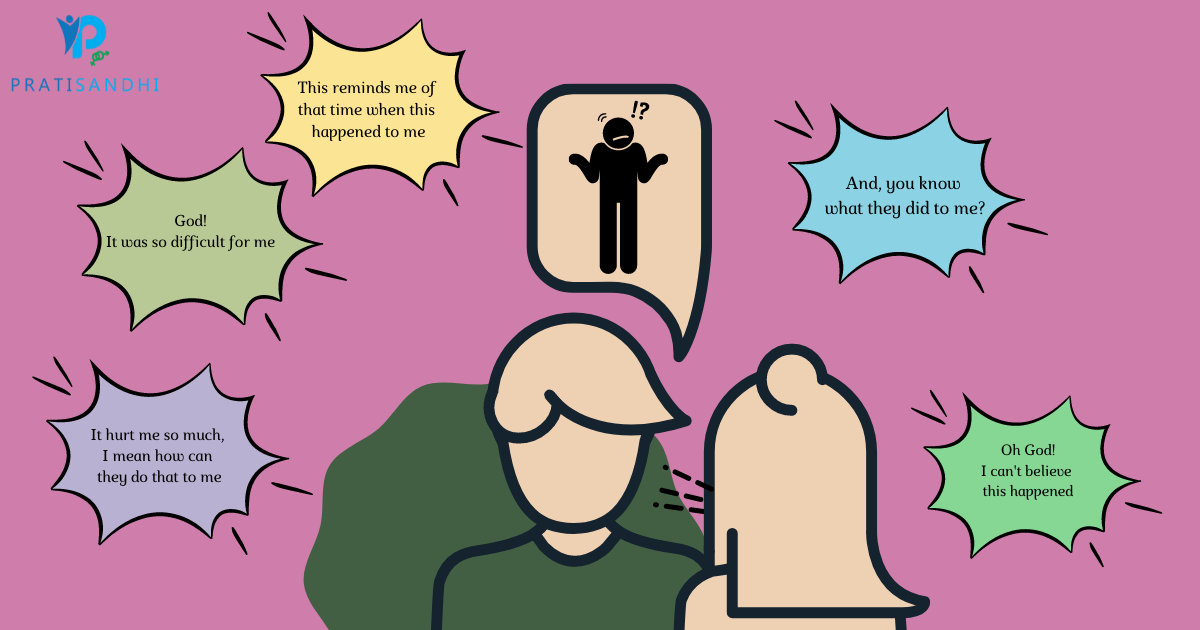
Trauma Dumping: How Much For How Long?
Let’s understand this scenario with a story:
Hammed has been through very traumatic experiences in his life. He was abused in his childhood by his parents and was bullied in school as well. He talked about his traumatic experiences to his friend Aman, his best friend. Every time they hung out, all Hameed would talk about was his abuse at home and the situation at school. Aman does not know how to help him and he begins to feel burdened by it. What should he do? How can he tell Hammed that he does not know how to help him? How can he talk to Hameed without hurting his feelings?
Social support can be very helpful at times when down. They are there for us when we need them. But, for how long can that amazing support system be there for you? There will come a day when that system will crash. We could say the same about trauma and emotional dumping.
Trauma dumping or emotional dumping is oversharing of traumatic experiences that is tiring or “too much” for the listener. When we go through something that is difficult, we usually rely on our circle for support and they listen to us and help us, right? But most of them are not trained to do so. Sometimes it can be intentional or unintentional. With this, let’s look at why it is important to talk about trauma dumping from the receiver’s end.

Why Talk About Trauma Dumping?
Everyone has a limit to listening to the other and it depends on one’s mood or personality and most of us do not know about it. A traumatic experience holds up a lot of space in one’s brain and dumping it on someone else is not fair. It becomes important to know how much one can take trauma whether online or offline. If you do not do so, it becomes difficult for the person listening or absorbing the experience. With that it becomes difficult for them to navigate their relationships. It becomes hard to go on with our daily life. With this it becomes hard to categorize what is venting and what is dumping. Let us now understand the difference between the two.
Is Trauma Dumping the Same as Venting?
It is healthy to talk about our thoughts and is always appreciated when we talk about it with our circle. Deepti Vijay Kumar who is a 36 year old software engineer says “As a family or friend you are a support system. It’s an unwritten part of our role” and we could not agree more. When somebody rants to us, they trust us enough to know what they are thinking about.
Venting is usually one of the healthier ways to deal with our sorrow or anger or frustration. It usually sticks to one topic and is not dragged for a long time. The speaker takes accountability and is open to solutions after talking. This method is good as it does not take much of the listener’s energy.
Dumping is toxic. The speaker tends to overwhelm the listener with a lot of issues and repeats the same thing. The speaker keeps talking about it and tends to blame other people. People who tend to trauma dump do not take accountability and are not open to solutions. This leads to the listener’s energy draining and them being stuck in that cycle. Let’s look at how you can avoid being in that situation and help their person.

What Can We Do If We Can't Listen?
Being there for the person suffering lessens their baggage. But, expecting the person to take the baggage from you is not fair. This is where communication becomes very important. Though there is no specific way to do it, here are some ideas you can keep in mind:
- Know your capacity: It is the most important thing for you to understand your capacities. Shafi, who is a student, freelance writer, and freelance social media consultant said “Have boundaries, and know your limitations.”
- Use the phrase “You’re not alone in this feeling” whenever necessary.
- Try using “I” when you are trying to communicate with the other person.
- Vent to someone who is available and can handle what you are trying to communicate.
- Talk to the person affected about trained professional help (therapy) and be supportive of it.
- If it is on social media, stop consuming the information. Shafi also said, ” If something or someone is being toxic and oversharing, stop consuming that media at that time itself.”

Conclusion
Talks about mental health and its importance have been around for a long time. Yet, many find conversations about mental health to be one sided. Only a few talk about the other side of the conversation. The listener can stop the other person, but many do not think it will spoil their relationship.
Vaishnave, who is a student says “An individual has the liberty to not listen and pause the conversation if it’s affecting their mental state.” This means that mental health is not only limited to the speaker, it is for everyone. Ananya, another student said “Everybody doesn’t have the emotional capacity to listen.” and we agree. Aaradhya, a counsellor said “They (the listeners) are not bad, they are unequipped,” which means you can choose to not listen to someone if it’s at the cost of your own mental health.
Nandini, who is a student says ” You know what is best for you, so if you think that you can’t listen to someone rant, that doesn’t make you a bad person,” which redirects us to think that not everybody is trained to listen to us and we have to be mindful about it. Yes, things are difficult at times but it does not mean that dumping it on someone is going to make it easier. As Nandini says ” Clear boundaries with the people you vent to is very important” and we could not agree more.
Illustration by: Anshika Maria Sunny
Author

Parnika
Trauma Dumping: How Much For How Long?
Let’s understand this scenario with a story:
Hammed has been through very traumatic experiences in his life. He was abused in his childhood by his parents and was bullied in school as well. He talked about his traumatic experiences to his friend Aman, his best friend. Every time they hung out, all Hameed would talk about was his abuse at home and the situation at school. Aman does not know how to help him and he begins to feel burdened by it. What should he do? How can he tell Hammed that he does not know how to help him? How can he talk to Hameed without hurting his feelings?
Social support can be very helpful at times when down. They are there for us when we need them. But, for how long can that amazing support system be there for you? There will come a day when that system will crash. We could say the same about trauma and emotional dumping.
Trauma dumping or emotional dumping is oversharing of traumatic experiences that is tiring or “too much” for the listener. When we go through something that is difficult, we usually rely on our circle for support and they listen to us and help us, right? But most of them are not trained to do so. Sometimes it can be intentional or unintentional. With this, let’s look at why it is important to talk about trauma dumping from the receiver’s end.

Trauma Dumping: How Much For How Long?
Let’s understand this scenario with a story:
Hammed has been through very traumatic experiences in his life. He was abused in his childhood by his parents and was bullied in school as well. He talked about his traumatic experiences to his friend Aman, his best friend. Every time they hung out, all Hameed would talk about was his abuse at home and the situation at school. Aman does not know how to help him and he begins to feel burdened by it. What should he do? How can he tell Hammed that he does not know how to help him? How can he talk to Hameed without hurting his feelings?
Social support can be very helpful at times when down. They are there for us when we need them. But, for how long can that amazing support system be there for you? There will come a day when that system will crash. We could say the same about trauma and emotional dumping.
Trauma dumping or emotional dumping is oversharing of traumatic experiences that is tiring or “too much” for the listener. When we go through something that is difficult, we usually rely on our circle for support and they listen to us and help us, right? But most of them are not trained to do so. Sometimes it can be intentional or unintentional. With this, let’s look at why it is important to talk about trauma dumping from the receiver’s end.

Why Should We Talk About Trauma And Emotional Dumping?
Everyone has a limit to listening to the other and it depends on one’s mood or personality and most of us do not know about it. A traumatic experience holds up a lot of space in one’s brain and dumping it on someone else is not fair. It becomes important to know how much one can take trauma whether online or offline. If you do not do so, it becomes difficult for the person to listen or absorbing the experience. With that, it becomes difficult for them to navigate their relationships. It becomes hard to go on with our daily life. With this, it becomes hard to categorize what is venting and what is dumping. Let us now understand the difference between the two.
Is Trauma Dumping The Same As Venting?
It is healthy to talk about our thoughts and is always appreciated when we talk about them with our circle. Deepti Vijay Kumar who is a 36-year-old software engineer says “As a family or friend you are a support system. It’s an unwritten part of our role” and we could not agree more. When somebody rants to us, they trust us enough to know what they are thinking about.
Venting is usually one of the healthier ways to deal with our sorrow or anger or frustration. It usually sticks to one topic and is not dragged for a long time. The speaker takes accountability and is open to solutions after talking. This method is good as it does not take much of the listener’s energy.
Dumping is toxic. The speaker tends to overwhelm the listener with a lot of issues and repeats the same thing. The speaker keeps talking about it and tends to blame other people. People who tend to trauma dump do not take accountability and are not open to solutions. This leads to the listener’s energy-draining and them being stuck in that cycle. Let’s look at how you can avoid being in that situation and help their person.

What Can We Do If We Can't Listen?
Being there for the person suffering lessens their baggage. But, expecting the person to take the baggage from you is not fair. This is where communication becomes very important. Though there is no specific way to do it, here are some ideas you can keep in mind:
- Know your capacity: It is the most important thing for you to understand your capacities. Shafi, who is a student, freelance writer, and freelance social media consultant said, “have boundaries, and know your limitations.”
- Use the phrase “you’re not alone in this feeling” whenever necessary.
- Try using “I” when you are trying to communicate with the other person.
- Vent to someone who is available and can handle what you are trying to communicate.
- Talk to the person affected about trained professional help (therapy) and be supportive of it.
- If it is on social media, stop consuming the information. Shafi also said, “If something or someone is being toxic and oversharing, stop consuming that media at that time itself.”

Conclusion
Talks about mental health and its importance have been around for a long time. Yet, many find conversations about mental health to be one-sided. Only a few talk about the other side of the conversation. The listener can stop the other person, but many do not think it will spoil their relationship.
Vaishnave, who is a student says “An individual has the liberty to not listen and pause the conversation if it’s affecting their mental state.” This means that mental health is not only limited to the speaker, it is for everyone. Ananya, another student said “Everybody doesn’t have the emotional capacity to listen.” and we agree. Aaradhya, a counselor said “They(the listeners) are not bad, they are unequipped,” which means you can choose to not listen to someone if it’s at the cost of your own mental health.
Nandini, who is a student says ” You know what is best for you, so if you think that you can’t listen to someone rant, that doesn’t make you a bad person.”
which redirects us to think that not everybody is trained to listen to us and we have to be mindful about it. Yes, things are difficult at times but it does not mean that dumping it on someone is going to make it easier. As Nandini says ” Clear boundaries with the people you vent to is very important” and we could not agree more.
Illustration by: Anshika Maria Sunny
Author

